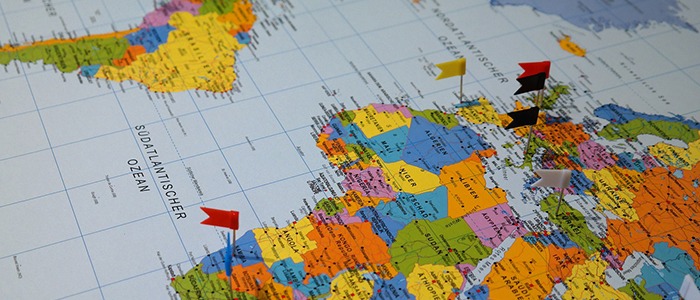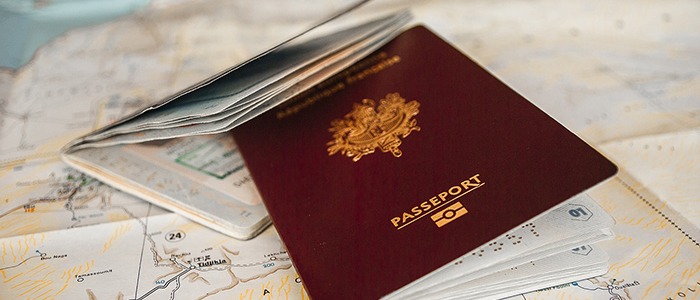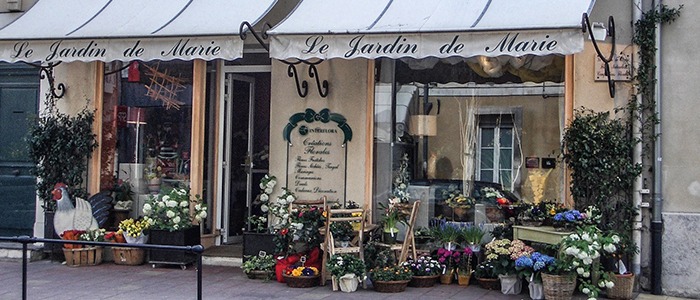Find Yourself Au Courant with French Prepositions of Place
If the thought of memorizing pages of French prepositions (along with all their exceptions) is exhausting, why not focus your efforts on the prepositions that will get you the most bang for your buck?
Learning a few prepositions at a time is much more manageable than trying to swallow a never-ending list! This article focuses on the most practical French prepositions used for geographical expression—in other words, the ability to describe where something is located or how it is positioned.

Being able to decipher where something or someone is located is incredibly important, especially when traveling in a French-speaking country. These prepositions could help you follow the directions to your hotel, find that art gallery you have been dying to see, and locate your friends at a party.
Staying sharp with geographical French prepositions is also smart for safety reasons, as these prepositions can allow you to describe your location in great detail in an emergency. Furthermore, it is always a nice gesture to be able to provide directions to lost tourists, and you never know when you may be approached by French-speaking travelers in need of a little directional guidance!
So go ahead, and find yourself au courant (aware and up-to-date) with these practical French prepositions for directional and positional description.

To and From: Using the French Prepositions À and De
Starting with the basics, these prepositions allow you to express where you’re from and where you’re going. A perfect ice-breaker when you’re looking to start a conversation with other tourists at your hostel! First, let’s focus on geographical expressions linked to countries and cities.

These prepositions (à, en, au and aux) can be used to show movement towards a place or to discuss time spent in the place.
à – to/ in (feminine)
en – to/ in (used with feminine countries and regions)
au (à + le = au) – to/ in (masculine)
aux (à + les = aux) – to/ in (plural)
À is used with most names of cities, since cities are almost always feminine. En is used with feminine countries and regions. Remember, if a country or region ends in the letter E, it is most likely feminine, and therefore will use the preposition en.
Je vais à Miami aujourd’hui. – I am going to Miami today.
Je vais en Floride aujourd’hui. – I am going to Florida today.
J’ai passé dix jours à Dublin. – I spent ten days in Dublin.
J’ai passé dix jours en Irelande. – I spent ten days in Ireland.
Marion est à Paris. – Marion is in Paris.
Marion est en France. – Marion is in France.
For masculine regions, use au, and for plural regions, use aux. Remember, if a country or region ends in a consonant or ends in any vowel except E, it is usually masculine. Also, besides a few exceptions, most plural regions end in the letter S.
Ma soeur va au Brésil. – My sister is going to Brazil.
Emilio habite au Chili. – Emilio lives in Chile.
Nous avons passés trois semaines aux États-Unis. – We spent three weeks in the United States.

To counter, these prepositions (de, du, des) express movement from a place or signify place of origin. Both cities and regions use a form of the preposition de. Note the subtle distinctions between these forms.
de – from (feminine; masculine without article)
du (de +le = du) – from (masculine with article)
des – from (plural)
Often, these prepositions will be used with an apostrophe before the name of the region or city. This occurs when the noun begins with a vowel, allowing for the preposition to be written without the article.
Marion vient de France. – Marion is coming from France. Marion is from France.
Demain, je viens d’Afrique. – Tomorrow, I am coming from Africa. (L’Afrique is feminine, so de is used. Because Afrique begins with a vowel, de l’Afrique become d’Afrique.)
Nous arrivons des États-Unis. – We are arriving from the United States.
Notice that when the verb venir is used, there is no distinction between the movement from a place and the expression of one’s place of origin. This is the case above in the example, ‘Marion vient de France.’ However, if there are other clues in the sentence, a more precise meaning can be determined.
For example, in the previous sentence, ‘Demain, je viens d’Afrique,’ the adverb, demain, qualifies a time for the action. This can be used as a clue for comprehension that the speaker is most likely expressing movement rather than place of origin.
Knowing Your Left from Right: Using the Prepositions À Gauche, À Droite and À Côté De
Get these mixed up and you’ll definitely be heading the wrong direction! These three expressions are all introduced with à.
à gauche – on/to the left
à droite – on/to the right
à côté de – next to/ beside
A simple trick for distinguishing left and right can be found in the spelling. ‘À droite’ includes the letters r,i,t,e—similar to ‘right.’ Take a look at these examples:
À droite, on voit la tour Eiffel. – On the right, you see the Eiffel Tower.
Tournez à gauche, s’il vous plait. – Turn to the left, please.
Il y a un panneau à côté de moi. – There is a sign next to me.
These three phrases will definitely come in handy when you’re finding your way around a new city!

The Nitty Gritty: Using the Prepositions Devant, Derrière and Entre
These three French prepositions will improve the precision of your language, as they focus on positional description.
devant – in front of
derrière – behind
entre – between/among
You don’t want to be running around the block looking for your friends, right? Find them quickly with these prepositions! Take a look at a few examples:
Megan attends devant la statue. – Megan is waiting in front of the statue.
La statue est derrière le magasin de fleurs. – The statue is behind the flower shop.
Le magasin de fleurs est entre le studio de yoga et l’hôtel. – The flower shop is between the yoga studio and the hotel.
J’ai trouvé une tulipe entre les roses. – I found a tulip among the roses.
With these common prepositions, you’ll be able to navigate in no time!

Preposition Challenge!
Now that we’ve covered a handful of the most practical prepositions for describing location and position, let’s put your skills to the test. Your roommate, Tom, is leaving for the weekend, but he wanted to pay you back the money he owed you before leaving town. Translate the note Tom left you, identify the four prepositions, and locate the money!
Salut! Je vais en Ecosse aujourd’hui. Je vais passer trois jours à Edimbourg. Devant la télévision, il y a des livres. Ton argent est entre “The Adventures of Huckleberry Finn” et “Sherlock Holmes.”
À bientôt! –Tom

Answer:
“Hi! I am going to Scotland today. I’m going to spend three days in Edinburgh. In front of the television, there are some books. Your money is between “The Adventures of Tom Sawyer” and “Sherlock Holmes.” See you later! –Tom”
Four prepositions: en Ecosse, à Edimbourg, Devant la télévision, and entre “The Adventures of Huckleberry Finn” et “Sherlock Holmes.”
For more tips on learning French check out LingQ cofounder and polyglot Steve Kaufmann’s YouTube channel!
LingQ is the best way to learn French online because it lets you learn from content you enjoy! You can import videos, podcasts, and much more and turn them into interactive lessons. Keep all your favourite language content stored in one place, easily look up new words, save vocabulary, and review. Check out our guide to importing content into LingQ for more information.
LingQ is available for desktop as well as Android and iOS. Gain access to thousands of hours of audio and transcripts and begin your journey to fluency today.
***
Aimee Willems has a Bachelor’s Degree in French and Francophone Studies and has spent a significant amount of time in France, French Guiana, and Senegal.


